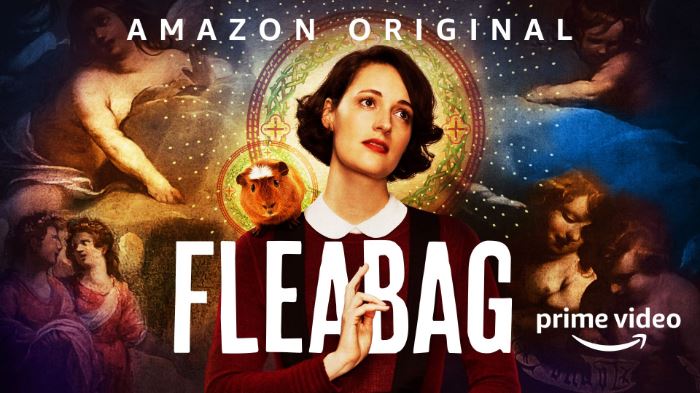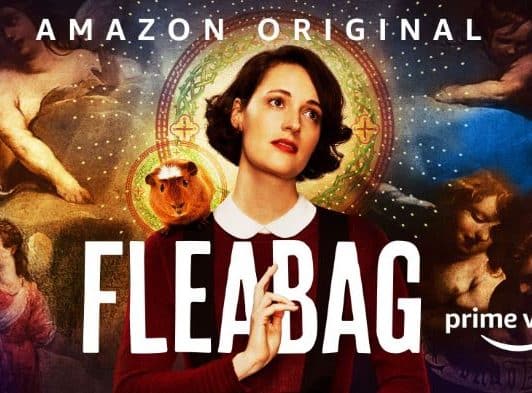It was the monologue heard around the world. Or at least, it was the monologue that made postmenopausal women turn to a friend and say, “She’s got that right!”
She being the actor Kristin Scott Thomas playing Belinda in the Amazon Prime series Fleabag.

Fleabag is one of my all-time favorite TV shows. Yes, it comes with many content warnings. Yes, the For the Strength of Youth pamphlets I grew up with would tell me to stay away from this show. Yes, the main character (who remains nameless in the show but is identified as “Fleabag” on IMDb) is a deeply flawed character with questionable morality. But at the core of the show is a central question: can I mess up, even massively, and still be worthy of love? And along with brilliant writing, that question makes the show deeply compelling to me.
Phoebe Waller-Bridge, writer and executive producer of this one-woman play turned TV-show, tackles this core question with humor and absurdity. And while Fleabag’s choices and circumstances are far from my own, she too grapples with life after losing her mother to cancer and, like me, goes for regular breast cancer screenings. So when I’m sitting in a thin robe on a doctor’s table and anticipating the doctor examining my breasts, I think back to Fleabag treating her screening like it is just so nice to have her breasts touched at all. It’s ridiculous and never fails to make me laugh. It’s a gift in an otherwise unpleasant circumstance.
Fleabag gave me another gift in Belinda’s monologue in Series 2, Episode 3. Belinda has been selected for a “Women in Business” award. Fleabag accidentally shatters the intended glass award plaque and, in a moment of panic, replaces it with a small sculpture of a woman’s body and breasts. As Fleabag had actually stolen this sculpture from her artist step-mom, she chases Belinda down after the ceremony to ask for the sculpture back. Belinda insists on hearing the full story, so they head to a bar to drink and talk. Belinda discusses the absurdity of an award that identify her as a “woman” rather than a “person” in business, along with the challenges and benefits of aging.
Belinda says, “I’ve been longing to say this out loud. Women are born with pain built in. It’s our physical destiny—period pains, sore boobs, childbirth, you know. We carry it within ourselves throughout our lives. Men don’t. They have to seek it out. They invent all these gods and demons so they can feel guilty about things, which is something we do very well on our own. And then they create wars so they can feel things and touch each other and when there aren’t any wars they can play rugby. We have it all going on in here, inside. We have pain on a cycle for years and years and years, and then just when you feel you are making peace with it all, what happens? The menopause comes. The f***ing menopause comes and it is the most wonderful f***ing thing in the world. Yes, your entire pelvic floor crumbles and you get f***ing hot and no one cares, but then you’re free. No longer a slave, no longer a machine with parts. You’re just a person. In business.”
Fleabag responds, “I was told it was horrendous.”
Belinda says, “It is horrendous. But then it’s wonderful. Something to look forward to.”
You can watch the scene here. And if you haven’t caught on yet, I’ll add a *language content warning.*
I watched this scene for the first time in 2019 at a time when I knew surgical menopause was about three years away for me. I thought about it many times. After my hysterectomy, the tissue analysis came back with the official diagnosis of adenomyosis. I suspected I had it, but it generally can’t be diagnosed with certainty until after a hysterectomy. With adenomyosis, endometrial tissue grows into the walls of the uterus, enlarging the organ and causing heavy, painful periods. Every 21-24 days I would start a horrendous period with massive blood clots and lots of cramps that would last 7-10 days. Like many women and menstruating people, I had pain built in on a cycle.
I began to wonder what it would be like to be free of that pain. Would it be something to look forward to?
I’m a few months post-surgery now. There are things such as osteoporosis and heart disease that I am now at a higher lifetime risk for and I will be managing those risks in a variety of ways for the rest of my life. But I will admit that it is wonderful to no longer have that intense pain and bleeding every month. The heavy bleeding and cramps interfered with many things in my life, and they’re just gone now. And with the help of medications that I started around the time of my surgery, I haven’t had hot flashes.
There isn’t only one way to feel about menopause. I know there are women who mourn the loss of fertility potential. There are a variety of symptoms and side effects that can be horrendous. There is so much work to do with researching menopause and other aspects of women’s healthcare and making the information and resources accessible. It isn’t simple or easy.
But from my own standpoint after surgical menopause, I second Belinda’s claim that at least the end of the cycles of pain brought via menopause is wonderful. Something to look forward to.
***
This post is part of the series Menopause and Me.






3 Responses
👏🏻👏🏻👏🏻👏🏻👏🏻
I recently read that the pain experienced during periods is similar to what is felt during a heart attack. And yet women, starting as girls, just go on with life. It’s rather unbelievable when I stop to think about it. For what it’s worth, the people writing the FSOY pamphlet may not know that dealing with pain like this as a regular part of life for years requires strong language.
“I recently read that the pain experienced during periods is similar to what is felt during a heart attack.”
That is crazy (technically impressive in a mind-boggling way). My oldest is finally hitting the mass milestones where her first period is a plausible event, so that is on my mind a fair bit.